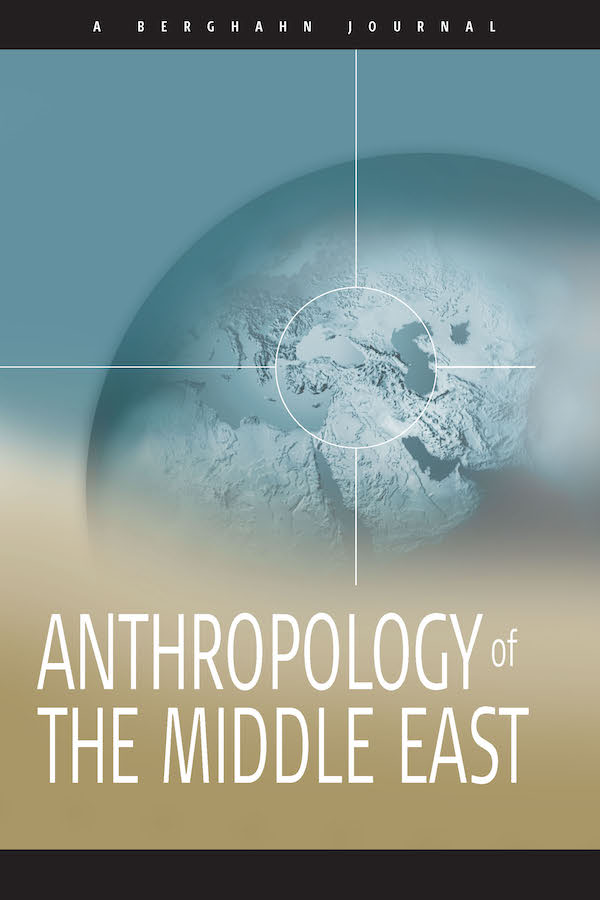
Anthropology of the Middle East
ISSN: 1746-0719 (print) • ISSN: 1746-0727 (online) • 2 issues per year
Editor in Chief: Soheila Shahshahani, Shahid Beheshti University, Iran
Subjects: Anthropology, Middle Eastern Studies
Winner of the Zubaydah Ashkanani Prize 2019:
Sezin Topçu: Between 'Greatness' and 'Ignorance': The Transition to Nuclear Power in Turkey
Anthropology in the Middle East 14:2
Latest Issue
Volume 20 Issue 2
Middle Eastern Migrants in East Asia
Navigation of Identity, Religion, and Belonging
This special issue of
Belonging beyond Borders
The Cultural Integration of Yemeni Refugees in Jeju
This article examines the acculturation of Yemeni refugees who arrived in Jeju, South Korea, in 2018 and their adaptation to Korean society five years later in 2023. Based on interviews conducted in 2024 with four Yemeni refugees and five Korean stakeholders, including government and private sector representatives, the article applies Ager and Strang's integration framework to analyse key factors influencing the refugees’ settlement. The findings reveal that state intervention was minimal, while private organisations and individual efforts played a significant role in integration. Factors such as language acquisition, employment, social networks and visa stability were crucial in shaping their adaptation. This article provides insights into how Korea, encountering large-scale refugee arrivals for the first time, managed this challenge and offers recommendations for future refugee policies.
Racialised Bordering and Immobility of Afghanistan Evacuees in Japan
This article examines Japan's racialised border control, which has manifested in the aftermath of the political changes occurring in Afghanistan in 2021. Although Japan has been the fourth-largest donor to Afghanistan for the past 20 years, many Afghanistan citizens with a ‘well-founded fear of persecution’ were confined within an immobility regime following the political crisis. Upon arriving in Japan, they were then confined amid socio-economic immobility due to a lack of substantive resettlement policies. A juxtaposition with the favourable treatment of Ukrainians constitutes the core of this racialised border control, wherein Japan's past engagement with Afghanistan's reconstruction has been conveniently forgotten. Within the increasingly unstable and fragile international order, where different policies are interconnected, it is not possible to commit to international development or international student policy without a substantive refugee policy.
The Protestant Right and the Rise of Islamophobia in South Korea
This article investigates the role of the Protestant Right in fostering Islamophobia in South Korea. It demonstrates that right-wing Protestant groups have strategically utilized their organizational networks to disseminate anti-Islamic rhetoric through three primary methods. First, they construct a narrative of ‘Islamization’ by invoking Europe's ‘failed multiculturalism’ as a cautionary example. Second, they employ nationalist discourse to portray Islam as a threat to Korean sovereignty. Third, they manipulate the language of human rights to exclude Muslims and prioritize the rights of Korean nationals. The article analyzes two key sources of data: (1) online ethnographic data from far-right Protestant speakers who have been vocal on the issue of Islam, and (2) ethnographic data collected from Daegu prayer rallies opposing mosque construction or a halal food complex.
The Used Car and Auto Parts Trading Industry and Afghan Migrant Entrepreneurs in Chiba, Japan
Afghans in Japan tend to cluster in two adjacent cities, Yotsukaido and Sakura, in Chiba Prefecture. The population of Afghans has increased rapidly since the 2010s and reached six thousand in June 2024. The main reason for this concentration is primarily the economic background. Chiba Prefecture has many used car and auto parts traders, and most Afghans are engaged in these businesses. The traders with ties to Japan have decided to move to Japan with their families. Chain migration through kin-based networks of compatriots has accelerated international population movement. Since 2011, the author has conducted sociological qualitative research on Afghan migrant entrepreneurs in the United Arab Emirates and Japan. This article examines the background of and issues related to the increase in Afghan migrants in Chiba Prefecture from a sociological perspective.
A Whole Village Involved in Raising Children
Community Mobilisation and Educational Integration of Afghan Special Contributors in South Korea
This ethnographic article examines educational integration of Afghan special contributors in Ulsan, South Korea, through community mobilisation for children's education. Drawing on mobility justice and hospitality theories, it investigates how exclusionary Korean society made exceptional accommodations for Afghan refugees. Based on 2022-2025 fieldwork with educators, administrators, and Afghan families, the article analyzes transformation from local resistance to community engagement. The research highlights Ulsan Metropolitan Office of Education's inclusive policy under ‘Not giving up on any child’, demonstrating collaboration among schools, government, private sector, and community organisations. While documenting successful Muslim immigrant integration, it critically examines the ‘special contributor’ designation's implications within Korea's refugee policy framework, contributing insights into overcoming cultural barriers and mobilising collective resources for refugee integration in East Asian
Reports
Paul Anderson,
Julie Peteet,
Magaret Kahn,